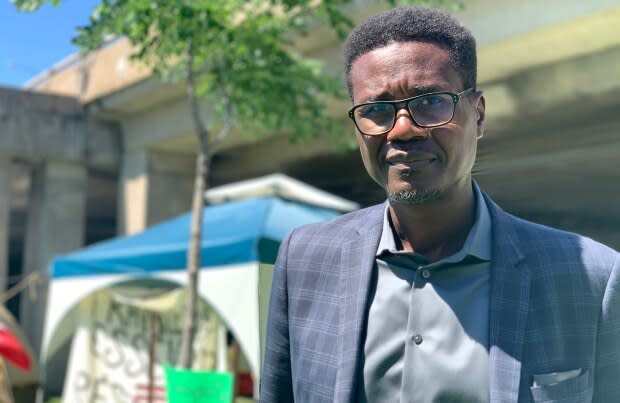Program to grant residency to asylum seekers who work in health care excludes hundreds, advocates say
On many of the mornings Megelere Dor went to work during the height of the pandemic last spring, he was the only one on the bus.
It was scary, but Dor felt he had no choice. Originally from Haiti, Dor has been in Quebec since November 2017 and still finds himself in limbo as an asylum seeker.
One day, he hopes his children and wife, who are still in Haiti, will join him. But much of that hope was dashed Friday morning when Dor learned he would not be among the thousand or so asylum seekers being granted permanent residency for their work during the pandemic.
"It hurts us because we're workers, too," Dor said. "We went to work so people at home could still eat during the pandemic."
Dor works at a factory making frozen pizza. Many food factories across the country were hit with outbreaks at the peak of the pandemic, often because employees must work in close quarters. During the pandemic, the Quebec government declared food production to be an essential service.
The Canadian Immigration Ministry's announcement that most asylum seekers who work in health care in Quebec will be granted permanent residency is a major disappointment to the hundreds of essential workers outside the health-care field, like Dor.
Many also work in hospitals and long-term care homes, but do not qualify because they do not directly care for patients. They are the cooks, the security agents, the cleaners.
"It's an ecosystem," said Wilner Cayo, the president of Debout pour la dignité, an organization that has been fighting for status for asylum seekers. "If you want to recognize the good work to help these seniors, you need to recognize all the people who were contributing in this effort."
"We want the government to understand: our people are very tired, they are anxious," Cayo added. "When everybody stayed home, they were outside working, risking their lives."

For more than a week, immigration advocates and asylum seekers have camped under the Highway 40 overpass near Prime Minister Justin Trudeau's Montreal riding office, calling on the government to come up with a policy that will let all asylum seekers already in the province to stay.
Friday morning at a news conference in Montreal, Federal Immigration Minister Marco Mendecino said asylum seekers who cared for patients in hospitals and long-term care homes at the height of the pandemic last spring can become Canadian permanent residents.
Mendecino's compromise with Quebec
The advocates at that campsite say the decision is unfair because it excludes hundreds of asylum seekers have been working long hours doing jobs that were deemed essential.
Mendecino said the federal government reached a compromise with Quebec to restrict the policy to those who've worked in patient care at a health-care institution for at least 120 hours between March 13 and August 14 and have six months of experience in patient care at a health-care institution by Aug. 31, 2021.
The Quebec government says about 1,000 people meet the criteria.
Joseph Flaubert, also with Debout pour la dignité, said it shuts out hundreds of other essential workers fighting to stay in the country.
"The [Quebec government] was probably afraid that their voter base wouldn't be happy," Flaubert said, referring to anti-immigrant movements in the province that were supportive of the Coalition Avenir Québec government.
Premier François Legault said he had stated months ago that he would look into creating a program with the federal government to allow health-care workers to stay.
Jenny Kwan, the NDP's federal immigration critic and the MP for Vancouver East, said the eligibility dates the government provided were arbitrary and restrictive. She added that the program fails "to recognize the importance of all essential workers and not just the people in the health sector."
Dor stopped by the campsite on Crémazie Boulevard north of downtown Montreal for the second time afterward to share his discontent with others, but the camp had shrunk.
Flaubert says that's because the many of the asylum seekers were so disheartened that they left.
Still, advocates acknowledged the immense relief the announcement would bring to health-care workers seeking permanent residency.

Gaëlle, a patient-care attendant at a private seniors' residence, is one of them. CBC has agreed not to use her last name because her immigration status is not yet settled.
"Those past months, they were very, very hard. The wait was painful and very stressful and now I think it's like a door opening to a brighter future for me."


